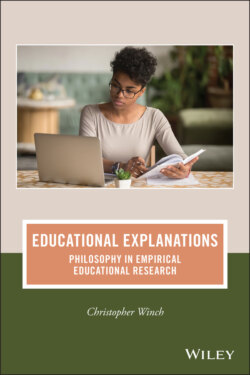Читать книгу Educational Explanations - Christopher Winch - Страница 12
EDUCATION AND CONTESTABILITY
ОглавлениеSo far we have argued that there is a categorial framework for thinking about education and educational practices. We have also argued that, within the framework, different conceptions of education will be found both between and within different societies. It is likely that there will often be disagreement about what is a suitable education and for whom. This points to a pervasive, if not universal feature, of education that particular conceptions and their suitability are contested between different groups. Sometimes these disputes will, as a matter of fact, concern which conception should be implemented and for whom. More likely though is the possibility that what is understood by rival conceptions may itself need interpretation, either because the contending parties are themselves not completely clear about what they are advocating, or because there is a misunderstanding between those contending parties concerning what they understand by those contending conceptions.
An example, which we shall further consider in Chapter 10, would be whether vocational preparation should count as education or as something else such as training Winch P. 2015.9 The issue can be seen as one of contesting conceptions between different societies, such as the Germanic tradition of Bildung and its related conception of Ausbildung or educative preparation for working life and the British tradition of training, which bears more relation to the classical Greek conception of vocational preparation mentioned earlier. These different conceptions come with their own conceptual frameworks, which include subtle conceptual variation in the concept of know-how between the two societies (see Brockmann et al. 2011). But the issue can also arise within a society such as Britain, where one can trace a change in the attitude to the educative role of industrial training in the post-war period and an increase in the influence of the idea of outcomes-based qualifications, which have their own conceptual peculiarities.
In this example we can see how substantive questions about educational policy and practice, for example – ‘what kind of vocational preparation should a developed country have?’ can become entwined with conceptual questions (and misunderstandings) about what exactly is vocational preparation (a conceptual question) or what should count as an acceptable form of vocational preparation and for whom (both a conceptual and a normative question). Here, as in other examples, investigation of the nature of an educational practice involves both questions about whether or not something is an educational practice and questions about what kind of educational practice it is or should be? We shall find that many empirical investigations of education involve a conceptual or hermeneutic element, both as preliminaries and as part of ongoing investigations. Failure to realise this and a lack of associated disciplinary expertise has often compromised the variety of approaches that are needed to effectively answer questions concerning education practice.
Recognition of contestability and the pervasive fact of contestation about educational contexts and practices opens up another difficult element of the understanding of educational research. The fact that a concept or a practice is contested usually means that it is understood or viewed from different perspectives by different observers or participants. Even when there is no overt contestation, the very fact that different categories of individuals tend to have a different perspective from individuals in other involved categories introduces the fact of multiple perspectives on educational concepts and practices. In this connection we have already mentioned the importance of a hermeneutic role in considering the conceptual frameworks involved in EER, but we now need to also take account of the different perspectives that may arise on educational practice.
